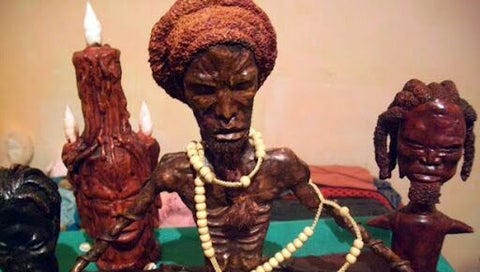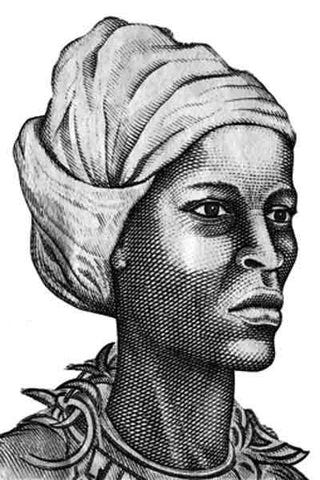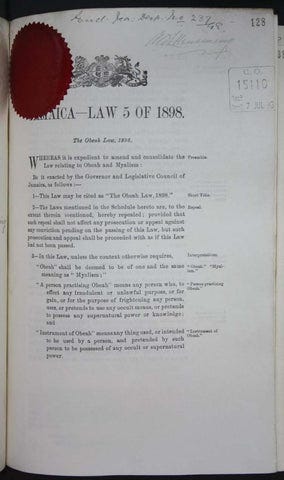Note to reader: This was originally posted on the Soul Searching blog back in April of 2020. I have made some updates for the current times.
If you’re not familiar with the term ‘Obeah’ let’s start with a little definitive history: the word Obeah is derived from the Twi word bayi which means sorcery or witchcraft. Similar to the Spanish word brujeria, which is simply a catch-all phrase that means witchcraft, Obeah is not defined by a unified set of practices nor does it have its pantheon of deities that it defers to. Obeah is the working of solitary practitioners through the use of herbs, roots, prayers, song, dance, and/or ritual. It should also be noted that through the lens of European colonization, Obeah came to be negatively associated with any spiritual practice that was not Abrahamic in its origins.
During the trans-Atlantic slave trade enslaved Africans brought their faith and rituals with them to the Americas. A few distinctive factors can identify African Traditional Religions: a belief in God, a reverence for the ancestors, and the belief in the use of earth magic to connect with higher powers. Through the guidance of the ancestors and the precise application of specific plants and prayers enslaved Africans believed that every obstacle had a distinct remedy.
Each island created a unique environment for these beliefs to take root. In Cuba, it blossomed as Lucumi, Palo and Arara. In Haiti, it developed as Voudun. In the Dominican Republic, it took the name of 21 Divisions. In Puerto Rico, it took root as Sanse. In Trinidad, it grew as the Orisha Baptist Church. In Jamaica, it established itself as Cumina. All of these practices would be considered Obeah.
In Jamaica, a large number of enslaved Africans were of Akan origin and came from what is now known as Ghana and Cote d’Ivoire, or the Ivory Coast. One of the languages spoken in that region is Twi. Jamaican Patois is the language that developed on the island and the dialect is comprised of loan words from English, Akan, Arawak, and even Irish influences among others. The sentence structure, grammar, and syntax are derived from Bantu languages. Obeah is a word that was adopted into the Caribbean lexicon during this time and became syncretized and later demonized as any earth-based spiritual practice.
But why was it demonized?
In most wars, God is often an afterthought when it comes to the colonization and enslavement of any people. Religion has been a constant and brutalizing force in the lives of oppressed people around the globe. For many enslaved Africans their beliefs are what kept them alive and supplied them with the perseverance to overcome the adversities that faced them in a hostile new world.
The transatlantic slave trade was a unique atrocity in that it not only systemically stripped the enslaved of their freedoms but of their native tongues, familial structures, and cultural identities. To truly break the spirit of a person so that they may accept the conditions of imprisonment without fighting back, the Europeans in power made deliberate strides to keep people not only enslaved physically and mentally but spiritually. If one has perseverance they have the will and stamina to fight their oppression and therein lies the problem.
The Haitian Revolution
In August of 1791 the Haitian Revolution began. There are many theories on how the Africans of Haiti overthrew their French oppressors but one truth remains clear: they did not win by brute force alone. Under the spiritual guidance of Voudun priestess Manbo Cecile Fatiman and the organizational efforts of Maroon leader and Hougan Dutty Bookman the enslaved Haitians were able to gain an edge over the French. After 12 long years of fighting the Africans of Haiti gained their independence from France and became the first free Black Republic in the Americas.
Haiti’s fight for freedom posed a huge problem to the European powers that governed the Caribbean: if the French could be challenged by their slaves then what would stop other enslaved Africans from getting bright ideas of freedom and autonomy? If the slaves no longer wished to toil in the fields, giving their blood, sweat, and tears to their oppressors for free then how would Europe continue to profit from the use of their bodies? The other colonies came to the understanding that these so-called superstitions with plants and prayers to deities with strange names must be the culprit. Surely, if these practices were outlawed then the risk of uprisings from the enslaved would cease to exist.
In Barbados, 14 years after the triumph of the Haitian Revolution, the first anti-Obeah law was enacted in 1818. One of the ways that African Traditional Religions stayed alive in the Caribbean was through the syncretization of Christianity. Lucumi in Cuba aligned the Orisha with Catholic saints and The Orisha Baptist Churches of Trinidad hid their traditional ceremonial practices in plain sight through Christian worship services. On other islands, enslaved Africans simply took to the hills and formed their societies where they were able to evade colonial persecution. In Jamaica, the Maroons were known for leading slave rebellions and assisting other enslaved Africans to escape to the mountains where they were granted refuge. One of the most feared and revered Maroons was Nanny who, over 3 decades, organized the escape of over 1000 slaves. She was also widely known as a very skilled and adept obeah practitioner. Through her extensive knowledge of herbs and healing medicines, she served as a spiritual leader, healer, and strategist for her people. This type of power and respect was not easily accepted by the British but they temporarily acquiesced in 1740 by signing a peace treaty that ended the First Maroon War.
Nanny of The Maroons
There is a lot of history that I’m skipping over to get to this part but I’ll come back in a later post to discuss how this act came into existence. In 1898 Governor A.W.L. Hemming, newly appointed by the Queen Victoria of England, signed The Obeah Law. The law explicitly forbids the practice of Obeah and defines its practitioners as “any person who, to effect any fraudulent or unlawful purpose, or for gain, or for the purpose of frightening any person, uses, or pretends to use any occult means, or pretends to possess any supernatural power or knowledge." Any person caught practicing Obeah was subject to flogging, a fine, and/or imprisonment, with or without hard labor for up to a year. Even the act of disseminating information about Obeah could lead to imprisonment. Simply put: anything that was not undeniably Christian was to be extinguished.
The Obeah Law of 1898
To this day Jamaica has the most churches per capita than any other country in the world. Despite intense opposition and persecution, Jamaicans have kept their spiritual practices in the form of Cumina drummings and even the funerary rituals of The Nine Night. The Nine Night is a practice of honoring and assisting the deceased with food, song, libations, prayers, and community. Throughout nine nights (nine being the number of the dead in many African traditional religious systems) the living gather to elevate the spirit of the dearly departed as death is not only an adjustment for the living but for the deceased as well. The Akan believe that it takes 9 days for a spirit to return to the ancestral plane. Upon completion of the Nine Night, the newly transitioned are encouraged to begin their new chapter in that realm, having been fully honored and celebrated. The basis of this belief is that a fully honored deceased person will not come back and wreak havoc on the living as a duppy, a malevolent and unsettled spirit. The practice of the Nine Night originates from the Ashante people of the Akan ethnic group from what is now known as Ghana.
So what’s the takeaway?
Anything that can be used as a tool of liberation can and will be demonized and outlawed by the powers that be. Even the nomenclature of the Jamaican Obeah Law was meant to further degrade these tools by insinuating that anyone who practices Obeah was merely pretending to have spiritual powers. The best way to discount someone's power is to insist that they do not have any. But if that is the case why enact a law against it in the first place?
In 2025 we are still responsible for not only learning the histories that have been hidden from us but we are charged with the task of decolonizing our minds. Obeah, as well as brujeria, still strikes a delicate chord with people of the diaspora. A lot of us are in the process of unlearning lifetimes of oppression and it is in that very process we have the power to redefine what is and isn’t demonic or evil. Within the context of European colonialism, we are all subject to its influences whether we want to acknowledge them or not. From our bodies to our minds, and even deeper into our souls, we have to take a hard look at how we see ourselves through the gaze of Whiteness and colonialism.
On February 7th, 2025 the White House released a memo about the formation of The White House Faith Office. The objective of the office is to combat “anti-Christian bias and discrimination” which leads me to wonder: when and how are Christians being discriminated against? The establishment of this office overrides the separation of church and state as is promised in the First Amendment of our nation’s Constitution. I am deeply concerned that the religious liberties of the African spiritual and religious communities in America are at stake.
Historically, our traditional diasporic beliefs have been demonized and targeted, as I have laid out in this post. The rise of White Christian nationalism coupled with the open brazenness of neo-nazis and other hate groups assembling more frequently in public has my spidey senses tingling. I don’t have a good feeling about the creation of this new White House faith office and I am almost certain it will be used to weaponize Christianity against the populace. My concerns also extend to the 1993 Supreme Court ruling of The Church of Lukumi Babalu Aye vs the city of Hialeah. In this historic ruling, the Court ruled in favor of the church’s ability to practice ritual animal sacrifice on the basis that it is no different from halal in a Muslim context and kosher in a Jewish one.
We had to petition the highest court in the nation to preserve our right to practice something our ancestors have been doing for millennia. With the recent executive orders by the current administration and the creation of this faith office, I would like all of us to think long and hard about what our ancestors fought for, how these spiritual and religious practices contributed to our collective liberation across nations, and what it means to preserve the richness and depth of our spiritual traditions as modern practitioners. We are the keepers of these traditions. We are the stewards of its care. Our ancestors are counting on us to move forward with courage, intention, and respect.
In short: obeah is not a bad word. Liberation is often offensive to the oppressor but your pursuit of freedom will continue to be a bone of contention to those who stand to profit from your fear, ignorance, and enslavement.
“Emancipate yourself from mental slavery. None but ourselves can free our minds.”
Robert Nesta Marley
Until next time,
Nikki
SOURCES CITED, BY SUBJECT:








Thank you so much for sharing this information to the world!!! I am a 2nd gen Jamaican with very distant roots. I’ve been trying to reconnect with Caribbean culture and spirituality, but it seems that most people in my family are involved in the church. This piece is inspiring me to look into Cumina 😊
Thank you for all of this. It is time to be strong, brave, and courageous. The old oppressions are dying out.